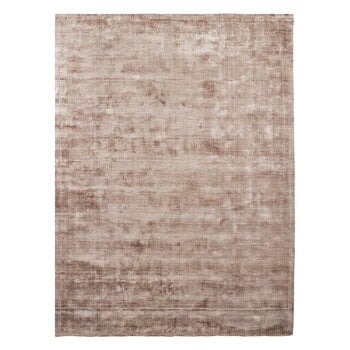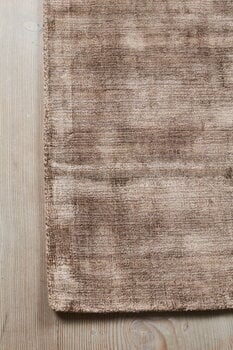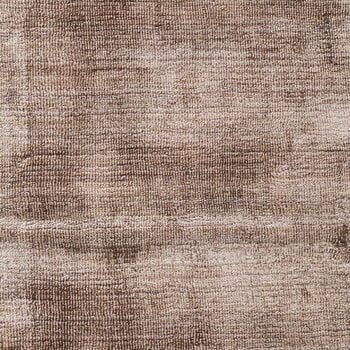Karma rug by massimo copenhagen gets its vivid character from the combination of interesting material, modest texture and beautiful, natural hue. The carpet is made from handwoven recycled bamboo – the material gives the mat a subtle, luxurious shimmer. Bamboo is a pleasant material not only for the eye but also for the environment, as it thrives without fertilisers or pesticides. Since bamboo is resistant to wear and tear, Karma rug is an excellent choice not only in the home but also for public spaces.
Karma rug, nougat brown
massimo copenhagen
Description
Karma rug by massimo copenhagen gets its vivid character from the combination of interesting material, modest texture and beautiful, natural hue. The carpet is made from handwoven recycled bamboo – the material gives the mat a subtle, luxurious shimmer. Bamboo is a pleasant material not only for the eye but also for the environment, as it thrives without fertilisers or pesticides. Since bamboo is resistant to wear and tear, Karma rug is an excellent choice not only in the home but also for public spaces.
Product details (9)
- Material
- 100% Handwoven Recycled Bamboo
- Colour
- Light brown
- Length
- 0 cm
- Width
- 0 cm
- Yarn height
- 5–7 mm
- Weight
- 0 kg
- Notes
- Size variation: +/-3%. Note that the colors may fade if the carpet is exposed to strong sunlight for a longer period of time. Staining from the backside of the carpet may occur so it is recommended to use an underlay carpet on delicate surfaces.
- Care instructions
-
Professional cleaning is recommended. Never clean with chemicals!
Daily cleaning: Use the vacuum cleaner without brush – frequently when the carpet is new as it will produce shed fluff for a period of time. Vacuum in the direction of the pile. It is a good idea to turn the rug around twice a year to avoid uneven wear and to place e.g. felt under the feet of heavy furniture standing on the rug. - Warranty
- 2 years
- Product ID
Reviews (1)
5
Based on 1 reviews
-
K
Katja S
Vaasa, Finland
Ecological and ethical carpet looks beautiful at our home.
70 days ago
Sustainability
The Product Sustainability Framework, our criteria of sustainable design, helps you find the most sustainable products in our selection. Read below which sustainability criteria this product has met.
Working conditions & labour 9/9
-
Equal opportunities for all employees
-
Commitment to UN Global Compact, fair compensation for all employees
-
Corporate responsibility requirements defined and communicated for suppliers
-
Systematic work for improved inclusion and well-being in the workplace
-
Transparent supply chain
-
Suppliers' compliance to a code of conduct ensured
-
Direct suppliers audited and certified
-
Compliance to the UN Guiding Principles on Business and Human Rights ensured in the supply chain
-
Support for community involvement in the supply chain
Eco-friendly production 6/9
-
Fair and resource-wise water-use in production
-
No incineration or landfilling of returned items
-
No use of endangered species as materials
-
No direct environmental emissions or waste (excl. GHGs) from production
-
Material-efficient and ecological packaging
-
No potentially harmful chemicals used in own production
-
The sustainability of direct suppliers' production is addressed and monitored
-
Production and material sourcing that respect biodiversity, animal rights, and natural ecosystems
-
Positive impact on nature’s well-being through operations that regenerate natural ecosystems
Climate impact 3/8
-
Company's direct greenhouse gas emissions identified and commitment to reduction
-
Product's carbon impact identified and commitment to reduction
-
Guidance on energy- and eco-efficient use of the product
-
Contribution to climate initiatives beyond the brand’s direct operations
-
Low-carbon or compensated transportation
-
Carbon footprint of the product calculated and goals set to reduce it
-
100 % renewable energy in own production and operations
-
Carbon neutral or carbon negative product
Sustainable materials 6/6
-
Sustainable and long-lasting material choices
-
No harmful or hazardous substances
-
Responsible raw material sourcing and production
-
Materials suited for circularity: monomaterials, recyclable finishings, renewable or recycled contents etc.
-
Ecological materials: natural, biodegradable, recyclable or recycled contents
-
Outstanding materials in terms of innovativeness, responsibility, sustainability and circularity: local production or sourcing, 100 % recycled content, C2C-certification etc.
Circular design 4/5
-
High aesthetic quality promoting long-term use of the product
-
Technically durable product design and material choices
-
Design for enduring life-long quality
-
Design and support for product maintenance, repair and upgradability
-
Innovative circular design solutions: circular service system, resale platform, remanufacturing, collection of used products, etc.










